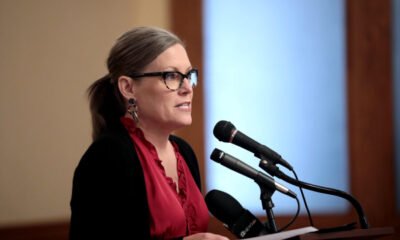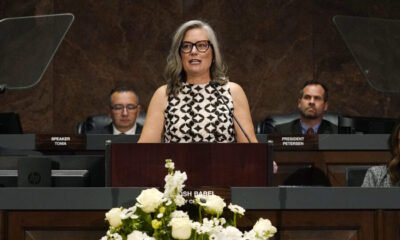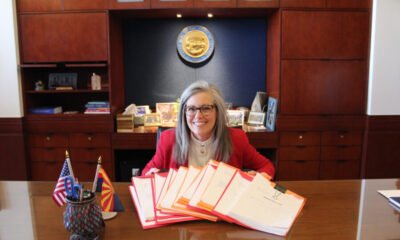Analise Ortiz
Hobbs’ Appointee Navigates Federal Law Amid GOP Pushback on Diversity Programs

The ongoing battle between Arizona’s far-right Republican senators and Democratic Governor Katie Hobbs took a new turn as allegations of misinformation were flung during a recent Senate committee hearing. Senator Jake Hoffman, a prominent figure in the Arizona Freedom Caucus, directly accused Carlos Contreras, Hobbs’ nominee for the Office of Economic Opportunity, of violating the state constitution.
Hoffman’s contention stemmed from Contreras’ adherence to federal grant requirements—a move necessary to secure crucial funding for Arizona’s workforce development. During the May 28 hearing, Hoffman challenged Contreras repeatedly, insisting that his justification for following these rules was insufficient.
“Hoffman is attempting to tarnish the reputation of qualified public servants,” stated Democratic Senator Analise Ortiz. “His claims are not only incorrect but misleading.”
Hoffman’s committee, created in 2023 specifically to scrutinize Hobbs’ nominees, has been marked by intense dissent. Since its inception, several nominees have faced hurdles, with some even withdrawing from consideration in anticipation of a hostile review process.
Prior to Hobbs’ administration, confirmations were usually straightforward, requiring little more than brief interviews. The changing political landscape has complicated this dynamic, as Hobbs previously attempted to appoint deputy directors to bypass Senate confirmation—a tactic that led to legal challenges and a court ruling against her.
Contreras, who has over two decades of experience at Intel, has been instrumental in the Office of Economic Opportunity since its inception in 2023. His office is tasked with bolstering workforce development strategies across the state.
During the hearing, Hoffman zeroed in on the scoring criteria of the BuilditAZ apprenticeship program, which is designed to fund construction training initiatives. The senator questioned the awarding of higher scores based on demographic factors like race and gender, arguing that it potentially violates Arizona’s anti-discrimination laws.
Contreras responded that the office was compliant with U.S. Department of Labor requirements, but Hoffman dismissed this explanation, insisting that the office’s participation in such a grant program was unwarranted.
“Turning down federal grants because of their stipulations is absurd,” Ortiz asserted, emphasizing the significance of such funding in strengthening Arizona’s economy.
Contreras faced mounting pressure from Hoffman, who maintained a hostile stance throughout the questioning. Despite this, Contreras clarified that selection for grants was not solely based on demographic characteristics.
The scoring rubric for the program prioritizes various demographic groups, including individuals with low incomes and disabilities, a fact that seemed to be overshadowed by Hoffman’s focus on race and gender. Ortiz noted that narrowing the conversation in this manner highlighted a concerning viewpoint that could disadvantage the state’s workforce.
Hoffman’s persistent claims regarding constitutional violations prompted Ortiz to suggest seeking guidance from legal experts. However, she was cut off by Hoffman, who insisted that more accountability should be placed on Contreras during the hearing.
Complicating the issue further, the Arizona Constitution’s anti-discrimination clause allows for actions that establish eligibility for federal programs, implying that federal requirements can supersede state law under certain circumstances.
As the meeting drew to a close, Hoffman agreed to adjourn without advancing Contreras’ nomination, allowing time for further consultations about legal obligations. Ortiz voiced her disappointment over the hold-up, advocating for a more informed discussion in future hearings.
“We’re wasting time and valuable state resources,” she emphasized, urging Hoffman to approach the next meeting with a clearer understanding of the laws at hand.




![Members of the Arizona House of Representatives vote during a third reading of nearly three dozen bills at the Arizona State Capitol on March 4, 2025. [Monica D. Spencer]](https://arizonanews.org/wp-content/uploads/2025/06/SR-347-Secures-53M-in-Third-State-Budget-Draft-Awaiting-400x240.jpg)
![Members of the Arizona House of Representatives vote during a third reading of nearly three dozen bills at the Arizona State Capitol on March 4, 2025. [Monica D. Spencer]](https://arizonanews.org/wp-content/uploads/2025/06/SR-347-Secures-53M-in-Third-State-Budget-Draft-Awaiting-80x80.jpg)












